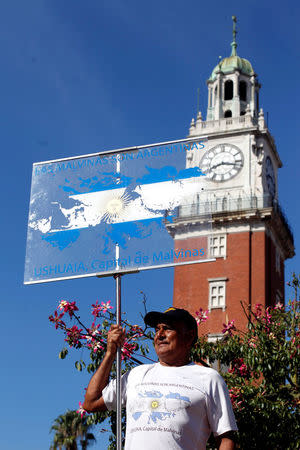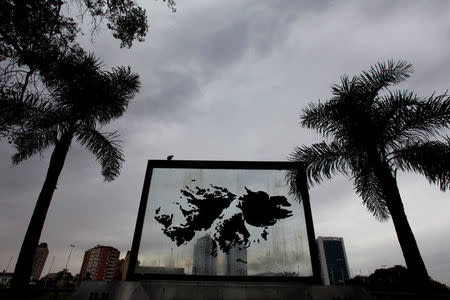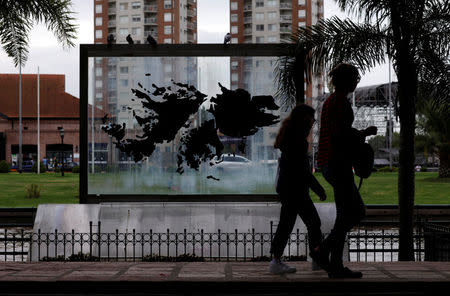Argentina seeks better British ties but Falklands claim remains
By Nicolás Misculin BUENOS AIRES (Reuters) - Argentina is pushing for closer ties with Britain ahead of its largest trade mission to London in two decades later this month by avoiding a historical point of disagreement: competing sovereignty claims to the Falkland Islands. Under President Mauricio Macri both sides have sought common ground on fishing and flights to the British-held islands some 500 kilometers off Argentina's coast 35 years after Britain won a brief war over their control. Argentina has also expressed interest in a bilateral trade deal as Britain exits the European Union, a conciliatory approach that contrasts with former President Cristina Fernandez threatening lawsuits and sanctions on oil companies operating in the Falklands. "There is a clear difference in the approach of the Macri government," Mike Summers, a long-time representative of the Falkland Islands' Legislative Assembly, told Reuters by email. The change is in line with a promise by Macri, who took office in December 2015, to open Argentina to the world after 12 years of protectionism. Growing closer to Britain is politically complicated in a country where recollection remains strong of the nearly 1,000 lives lost, mostly Argentine, in the 1982 war. Macri's strategy is to focus on what Argentina calls the 80 percent of issues of common interest between the two countries. It avoids the other 20 percent, namely the competing sovereignty claims. Nearly all the 3,000 islanders, 99.8 percent, prefer to remain a British territory according to a 2013 survey. An Argentine government source who participated in recent talks told Reuters the British government also accepts negotiations that avoid touching on sovereignty claims. In December, Argentina and Britain agreed on a framework to identify the bodies of dozens of Argentine soldiers buried on the islands, known as Islas Malvinas in Argentina. But Summers said Argentina's government had not yet upheld a September 2016 agreement to remove restrictions on the oil and gas, shipping, and fishing industries and introduce new flights originating from third-party nations. A spokesman for Chile-based Latam Airlines Group , which runs the only direct flight from Argentina to the islands, said the airline had not received any official notification about a formal intention to introduce new air links. Looser restrictions on fishing, a primary source of income for islanders, are more likely and Britain and Argentina could exchange information to combat illegal catches by Asian trawlers, a British government source said. The March 20-24 trade mission to Britain will bring representatives of a range of sectors including oil and small-and medium-sized businesses. HEALING WOUNDS With mid-term congressional elections in Argentina scheduled for later this year, the opposition Peronists may use the Falklands to rally political support with Argentines who preferred Fernandez's more nationalist approach. In one recent episode illustrating the need to tread carefully, Argentina issued a statement criticizing Brazil for allowing at least six flights from Brazilian military bases to the Falklands last year. A Brazilian diplomatic source told Reuters the flights were for humanitarian purposes and Argentina had issued the statement only after opposition lawmakers accessed the information on the flights and used it to criticize what they called increasing militarization of the islands. The British government says the number of troops in the Falklands has fallen steadily since the April 1982 conflict to 1,200 currently. There were actually fewer flights from Brazil last year than in 2015, the Argentina statement said. While some Argentines continue to protest British control of the islands and rock stars wear T-shirts supporting them, others want reconciliation. Human rights activist and 1980 Nobel Peace Prize winner Adolfo Perez Esquivel travelled to the islands with other activists earlier this month. "We hope to be able to communicate with the islanders and for them to come visit the continent ... to see the possibility of healing wounds," Perez Esquivel said during the trip. (Additional reporting by Caroline Stauffer in Buenos Aires, Anthony Boadle in Brasilia and Rosalba O'Brien in Santiago; Writing by Caroline Stauffer; Editing by Matthew Lewis)

 Yahoo News
Yahoo News 





